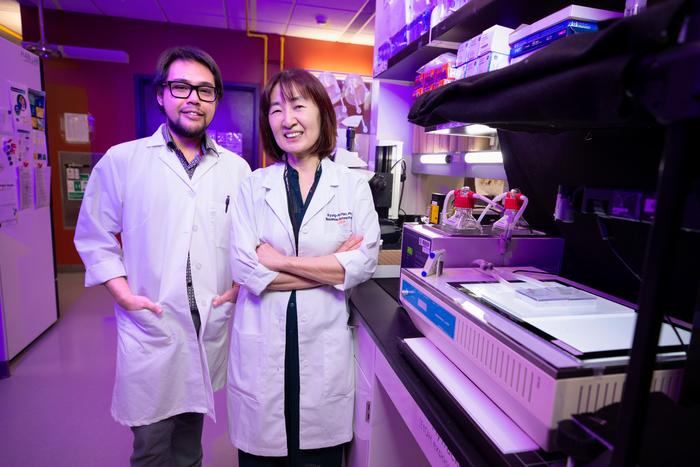EL PASO, Texas (Aug. 6, 2024) – Grab a drink with friends at happy hour and you’re likely to feel chatty, friendly and upbeat. But grab a drink alone and you may experience feelings of depression. Researchers think they now know why this happens.

Credit: The University of Texas at El Paso.
EL PASO, Texas (Aug. 6, 2024) – Grab a drink with friends at happy hour and you’re likely to feel chatty, friendly and upbeat. But grab a drink alone and you may experience feelings of depression. Researchers think they now know why this happens.
“Social settings influence how individuals react to alcohol, yet there is no mechanistic study on how and why this occurs,” said Kyung-An Han, Ph.D., a biologist at The University of Texas at El Paso who uses fruit flies to study alcoholism.
Now, Han and a team of UTEP faculty and students have taken a key step in understanding the neurobiological process behind social drinking and how it boosts feelings of euphoria. Their new study, published in a recent issue of the journal Addiction Biology, pinpoints the region of the brain that is stimulated by social drinking and may lead to a better understanding of how humans become vulnerable to Alcohol Use Disorder (AUD), a disease that affected nearly 29.5 million people just this past year, according to the National Institute on Alcohol Abuse and Alcoholism.
Turns out that tipsy fruit flies aren’t that different from intoxicated humans. Although they might seem like an unconventional choice from which to derive knowledge about human behavior, these insects share about 75% of the same genes that cause human diseases, Han explained.
Using fruit flies, Han and her team sought to demonstrate that ethanol, the alcohol in drinks, causes different reactions in solitary versus group settings and that dopamine, the brain molecule that plays a role in pleasure, motivation and learning, is a key player for this phenomenon.
The team’s experiments consisted of exposing fruit flies, either alone or in a group setting, to ethanol vapor and measuring their average speed to determine the degree of ethanol-induced response. While flies who “drank alone” displayed a slight increase in movement, flies exposed to ethanol in a group setting displayed significantly increased speed and movement.
The team then proceeded to test whether dopamine plays a role in the flies’ response to ethanol, comparing a control group whose dopamine was naturally regulated by the brain with an experimental group that had increased levels of dopamine.
The team found that the flies, regardless of whether they had normal or increased levels of dopamine, had a similar reaction to ethanol in a solitary setting — a tiny increase in activity. But in social settings, the flies with increased dopamine showed even more heightened hyperactivity than usual.
“We demonstrated that both social settings and dopamine act together for the flies’ heightened response to ethanol,” said Han who currently serves as associate dean in the College of Science.
The team’s final task was to identify which of the five dopamine receptors in the brain is the largest contributor in this process and found that the D1 dopamine receptor was most important to flies’ reaction to ethanol in a social setting.
“The human D1 receptor gene is linked to Alcohol Use Disorder and this study provides experimental validation for it. For the team, the identification of the D1 receptor is crucial as it gives researchers at UTEP and beyond a blueprint for follow up studies,” Han explained.
“Our work is providing scientific knowledge to support the idea that the brain interprets and processes a person’s social surrounding and has that signal converge into the dopamine system that is also activated by alcohol consumption,” said Paul Rafael Sabandal, Ph.D., a research assistant professor in biological sciences and one of the study’s corresponding authors. “It gives us as researchers an idea of which brain area and components may serve as the meeting point for all the signals that contribute to AUD.”
The team’s next step is to explore the intricacies by which the D1 dopamine receptor serves as the nexus point for the signals that contribute to the ethanol, social interaction and AUD.
Han said, “The opportunity to work on projects whose positive impact can be applied at scale is one of the reasons I became a scientist. It’s humbling to know that our work has the potential to help people live better lives and our team is going to continue striving toward achieving that goal.”
Additional study authors are former UTEP undergraduates Dilean Murillo Gonzalez and Bryan Hernandez Granados, who are now at the Baylor College of Medicine Neuroscience Graduate Program and the Vanderbilt University Postbaccalaureate Program, respectively.
The research was funded by UTEP’s Orville Edward Egbert, M.D. Endowment fund.
About The University of Texas at El Paso
The University of Texas at El Paso is America’s leading Hispanic-serving university. Located at the westernmost tip of Texas, where three states and two countries converge along the Rio Grande, 84% of our 24,000 students are Hispanic, and more than half are the first in their families to go to college. UTEP offers 170 bachelor’s, master’s and doctoral degree programs at the only open-access, top-tier research university in America.
Journal
Addiction Biology
Article Title
Social setting interacts with hyper dopamine to boost the stimulant effect of ethanol
Article Publication Date
19-Jun-2024



